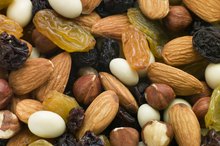Liquid Diet & Constipation
Following a liquid diet may lead to gastrointestinal distress such as constipation, making you feel uncomfortable and bloated. Most of the time, this is a temporary side effect and resolves itself. If constipation causes pain or if it occurs for several days, let your doctor know. It may be an underlying symptom of another issue.
Liquid Diets
Your doctor may request that you follow a liquid diet before undergoing a medical procedure or surgery. Clear liquid diets limit your food intake to anything you can see through that does not have any food particles. For example, you can have juice, but not juice with pulp. As a meal, enjoy beef broth, avoiding soups with food pieces. Additionally, clear liquid diets include any clear food that is liquid at room temperature, such as frozen pops or gelatin desserts. Full liquid diets include anything liquid at room temperature, including plain ice cream, meal replacement drinks and milk. Your doctor may also allow you to include pureed and strained foods or cream of wheat.
- Your doctor may request that you follow a liquid diet before undergoing a medical procedure or surgery.
- Additionally, clear liquid diets include any clear food that is liquid at room temperature, such as frozen pops or gelatin desserts.
What is Constipation?
List of Soft Foods Allowed Following Surgery
Learn More
Having infrequent bowel movements or dry, hard and difficult-to-pass stools define constipation. If you go for three days or more without a bowel movement, you may be suffering from constipation. Following a low-fiber diet, such as a liquid diet, or having insufficient fiber intake is the leading cause of constipation, explains the University of Maryland. Being physically inactive, dehydrated or having a high amount of stress can also contribute to constipation.
- Having infrequent bowel movements or dry, hard and difficult-to-pass stools define constipation.
- Following a low-fiber diet, such as a liquid diet, or having insufficient fiber intake is the leading cause of constipation, explains the University of Maryland.
Lack of Fiber
The purpose of a clear liquid diet is to rid your digestive tract of residue left behind by food particles, allowing for a safe, smooth surgical procedure and speedy recovery. Your body does not break down fiber; instead, it travels through your gut relatively intact. Since a clear liquid diet excludes fibrous foods, such as whole grains, vegetables and fruits, you won't get adequate fiber. Without the recommended 25 to 38 g of fiber you need each day, food may sit in your digestive tract for an extended period, unable to pass, leading to constipation. Full liquid diets provide some fiber from meal replacement drinks, shakes or pureed foods, but your fiber intake remains minimal, depending on the foods you consume.
- The purpose of a clear liquid diet is to rid your digestive tract of residue left behind by food particles, allowing for a safe, smooth surgical procedure and speedy recovery.
- Full liquid diets provide some fiber from meal replacement drinks, shakes or pureed foods, but your fiber intake remains minimal, depending on the foods you consume.
Additional Considerations
Diet & Nutrition for Collagenous Colitis
Learn More
Your bout with constipation may relate to a total reduction in the foods you consume. While you may feel constipated or notice that you haven't had a bowel movement in days, the cause might be a lack of food for your body to digest. Since you should follow a clear liquid diet only for a specified time, your infrequent bowel movements should return to normal when you resume a regular diet. Additionally, your physician may want you to take a laxative or have an enema to help clear out your bowels. After all waste passes, there may be little in your intestinal tract to pass. Instead of being constipated, your bowels may just be empty. Talk with your physician about your constipation concerns. He can give you suggestions to alleviate any discomfort.
- Your bout with constipation may relate to a total reduction in the foods you consume.
- Additionally, your physician may want you to take a laxative or have an enema to help clear out your bowels.
Related Articles
References
- Linus Pauling Institute: Fiber
- Barajas-Gamboa J, Corcelles R, Kroh M. Endoscopic Intramural Surgery Part II: Muscular Division. Dig Dis Interv. 2018;02(04):368-374. doi:10.1055/s-0038-1676504
- Full Liquid Diet | Gillette Children’s Specialty Healthcare. Gillettechildrens.org.
- Avalos D, Sussman D, Lara L, Sarkis F, Castro F. Effect of Diet Liberalization on Bowel Preparation. South Med J. 2017;110(6):399-407. doi:10.14423/smj.0000000000000662
- Deacon S.; Moran, N.; Laskey-Gilboy, B. et al. Dietetic intervention for inpatients on fluid‐only diets helps to achieve nutritional requirements. Nutrition & Dietetics. 2018;75(1):17-23. doi:10.1111/1747-0080.1235.
- DeWitt TM. An Exploratory Study: Clinical Dietitians Do Not View the Full Liquid Diet as Best Practice for the Post-operative Patient. Journal of Nutrition & Food Sciences. 2014;05(02). doi:10.4172/2155-9600.1000345
- Mathew R. Rammya Mathew: Liquid diets offer promise, but we still need upstream solutions. BMJ. January 2019:k5340. doi:10.1136/bmj.k5340
- Morrison Healthcare Archives. Manual of Clinical Nutrition Management. Compass Group, Inc.; 2015.
- Nguyen D, Jamal M, Nguyen E, Puli S, Bechtold M. Low-residue versus clear liquid diet before colonoscopy: a meta-analysis of randomized, controlled trials. Gastrointest Endosc. 2016;83(3):499-507.e1. doi:10.1016/j.gie.2015.09.045
Writer Bio
Melodie Anne Coffman specializes in overall wellness, with particular interests in women's health and personal defense. She holds a master's degree in food science and human nutrition and is a certified instructor through the NRA. Coffman is pursuing her personal trainer certification in 2015.







